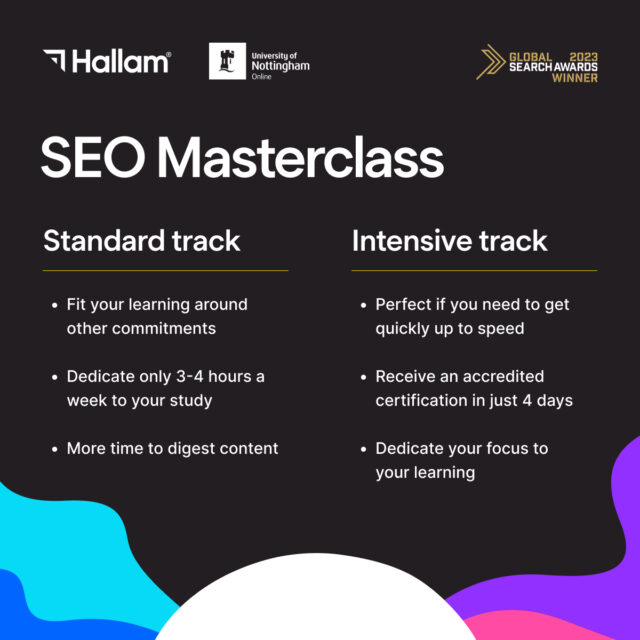SEO (search engine optimisation) is a vital skill for all in-house marketers and, while the inclusion of SEO in a marketing strategy isn’t exactly a new phenomenon, its importance can sometimes be overlooked.
The fact remains: if you want your business to be recognised as relevant to your customers by Google then it’s important to build on your understanding of SEO and develop the fundamental SEO skills needed to make sure your brand is showing up in search engine results pages (SERPs).
A great way to start building a solid foundation of SEO knowledge is by embarking on SEO training courses specifically revolving around putting SEO learnings into real-world, professional practice.
As an in-house marketer who recently enrolled on the University of Nottingham’s Mastering SEO: Fundamentals course, I’ll take you through the basics of SEO and what you can expect to learn on the course, as well as how the course has benefitted my in-house marketing role.
This guide will cover:
- What you can expect to learn
- What is SEO?
- The four pillars of SEO
- The benefits of SEO training for an in-house marketing role
- Good things to know before learning SEO
What can you expect to learn?
The Mastering SEO: Fundamentals course guides you through the very basics of understanding what SEO is and how search engines work, leading onto exploring SEO principles and putting these into practice for optimising content through live tasks and assessment.
Let’s start by walking through the very basics.
What is SEO?
Our Head of Organic, Carmen Dominguez, said: “SEO is an essential marketing activity that allows your business to grow traffic from search engines, providing access to more customers, more leads and more revenue. Think of it like opening your shop onto the busiest high street in the world. SEO enables marketers to demonstrate to search engines that their web page is the most relevant to a user’s search query.”
A successful SEO strategy is made up of many different aspects but, at a high level, includes:
- Identifying what your customers are searching for and which search terms have high traffic potential
- Creating trustworthy, relevant content that is optimised for both search engines and users.
- Measuring your results, analysing your data and continuously adapting and improving your strategy.
The four pillars of SEO
The course explains the different aspects to consider when optimising for SEO, splitting them into four pillars of focus; relevancy, authority, technical SEO and user experience (UX), each helping us tackle SEO challenges through different lenses.
If you’re an in-house marketer without SEO specialists to hand, using the pillars will act as a first port of call for identifying which areas of SEO you excel in – and which areas need improvement.
Relevancy
The first pillar, relevancy, is all about how relevant your web page is to what your users are searching for. Great content is key for a successful website, and this starts with research into what your customers are looking for.
Once you begin to understand this, you can start to answer your customers’ queries and provide solutions – you need to ground your content strategy in this SEO data. Useful content, with clear headings and meta descriptions, will rank well in search engines but this takes time to build up – you won’t see results after publishing one blog.
Authority
Google won’t rank your website highly in the SERPs if it doesn’t trust it – this is where the pillar of authority comes in. It’s important to build links to and from your website, and these links should be to relevant and trustworthy sources.
Conduct a competitor analysis to see where you may be missing link opportunities, and additionally collaborate with relevant brands on social media to increase your brand’s authority further.
Technical SEO
For Google to determine whether the content on your website is relevant to your user or an authority, it first needs to be able to find it. If Google can’t crawl, index and rank your site, then the other pillars become mostly futile.
This pillar is technical SEO; to make sure this aspect of SEO isn’t affecting your rankings, you’ll need to regularly carry out website health checks.
User experience
Getting your user to your website is one thing, but keeping them there is another. All of the pillars so far will allow your brand to be found by users, but providing a good user experience (UX)and matching their search intent is what will make them stay.
UX on your site includes things like visuals and page load speeds; this aspect of SEO can also affect your ranking in the SERPs because Google will begin to value your website less if your users are constantly leaving unsatisfied.
How does SEO training benefit in-house marketers?
The course has a strong focus on coupling the academic learnings of SEO with the practicality of application, making it the ideal course for in-house marketing professionals.
The course expands on the four pillars of SEO, exploring how they translate into tools that can be put into practice for creating optimised pieces of content that will rank your brand in the SERPs.
Learn to put SEO into practice
Much like myself, most in-house marketers will have the task of creating content for your website, with the hope it might draw in new potential customers from search engines. The course provides real-life scenarios, such as analysing copy for its SEO optimisation and creating your own SEO-optimised blog that puts your learning to the test.
Learning to optimise content for SEO is essential if you want your content to rank higher in the SERPs – especially for in-house marketers not working with SEO specialists.
Practise a forward thinking mindset
The digital landscape, and particularly the four pillar SEO model, is constantly evolving and being influenced by changes in consumer behaviours and new technologies. The course critically encourages marketers to practise a forward-thinking mindset – a key skill all marketers should have – that will enable you to consider and anticipate any future developments that may have an impact on your SEO strategy and, ultimately, your brand’s recognition.
SEO is an integral part of every marketing strategy
A brand can’t reach its full potential without SEO included in its marketing strategy. This means in-house marketers absolutely need to have SEO skills if customers are going to find their brand through search engines.
Crucially, the course guides marketers on how to communicate the importance of SEO to stakeholders and clients and how to spot potential SEO opportunities from wider marketing feedback.
What you need to know before learning SEO
While I’ve discussed the importance for in-house marketers to develop SEO skills, I also recognise first-hand that in-house marketers are busy people already committed to full-time jobs, so it’s important to manage any expectations before embarking on your SEO learning journey.
Can I learn SEO in one month?
You can certainly build a great foundation and understanding of SEO within one month. Both the Mastering SEO: Fundamentals and Tactics & Insights courses can be delivered as a 4-day intensive track, making it possible to gain a solid understanding of SEO and ability to construct a tactical SEO plan in just two weeks.
Is SEO hard to learn?
SEO can be challenging to learn to begin with as it requires you to adopt a different approach to producing content than you might’ve taken before. However, anyone can learn SEO with the right materials and practice, and the course leaders at the University of Nottingham guide you through the content.
Will SEO exist in 5 years?
Absolutely: SEO isn’t going anywhere. SEO will continue to be a crucial way of getting your business found and will always find a way to adapt.
However, with many evolving technologies, search engines and algorithms will continue to change so it’s important for SEO professionals to keep up with the latest updates.
Start your SEO journey
Start learning SEO and get your brand found while receiving an esteemed accreditation from the University of Nottingham Online.
Join the next Mastering SEO: Fundamentals class in January.





